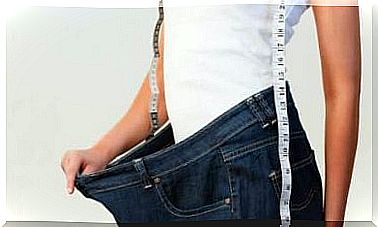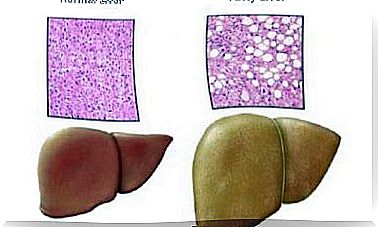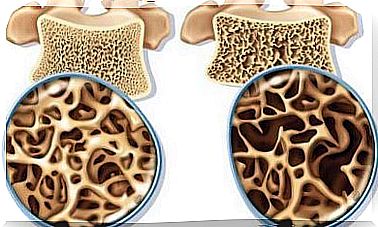Find Out If You Have Fatty Liver By Observing 6 Symptoms
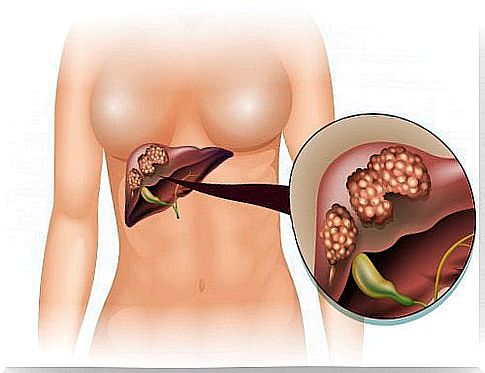
Fatty liver is associated with obesity, high cholesterol, and high blood pressure. This disease is difficult to detect. However, there are symptoms that may make it easier to recognize.
The Latin name for this disease is Steatosis hepatis , but it is commonly known as fatty liver . It can be caused by alcohol abuse or by disorders such as diabetes and high blood pressure.
What is fatty liver?
When excess fat accumulates in hepatocytes, the cells of the liver, it can lead to fatty liver disease. This disorder is most often associated with obesity, high cholesterol and hypertension.
Often times, the body’s fat cells “donate” excess fat to neighboring organs. It is important to know that the liver performs a number of vital functions: it produces proteins, regulates fat metabolism, removes toxins from the bloodstream and controls the amount of amino acids. For this reason, it is very important to keep your liver in good condition.
There are many risk groups for developing fatty liver, including:
- middle aged women
- overweight people
- patients with diabetes or elevated cholesterol
- people with bad eating habits
- alcohol addiction
Fatty liver – warning signs
There are 3 types of tests for fatty liver:
- blood test (to find out the level of transaminases)
- ultrasound scanner (the more shiny and oversized the liver, the greater the risk of the disease)
- biopsy (to find out how advanced the disease is)
Some patients also experience the following symptoms:
Abdominal pain
The discomfort or stinging is in the central or upper right side of the abdomen. It appears for no particular reason, without point pressure.
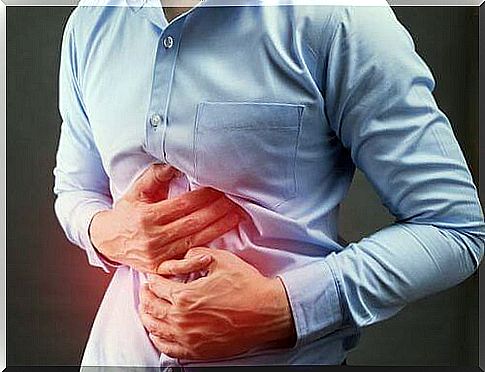
It can appear after a meal, as the dilating stomach puts pressure on the diseased liver.
Swollen abdomen
Ascites is a build-up of fluid in the peritoneal cavity. Signs of this problem are a swollen abdomen, indigestion, lower back pain and trouble breathing. In addition, it may be accompanied by ankle swelling.
Indigestion
If, despite eating healthy and eating small amounts, eating results in abdominal pain, vomiting and gas, it may be because of liver problems. Many patients with a fatty liver see their doctor for indigestion, and after testing they find out that the problem is a fatty liver .
Tiredness
When the liver is not working well, the metabolism slows down. The same happens when other vital organs of the body malfunction. The body adapts to the new situation and balances it by pumping less blood.

This case is special, it can result in indescribable fatigue, loss of energy, concentration problems and confusion. A person may lose interest in activities they previously enjoyed and spend their days continuously sleeping.
Dark color of urine
We can recognize various diseases through urine. You have to remember that urine removes toxins and waste products from the body. In the case of a fatty liver, urine may turn darker throughout the day (it is normal for urine to be darker in color in the morning, but then turn lighter in color).
In the case of fatty liver, the feces may also have a different color – lighter, almost white. It may have a more unpleasant odor than usual.
Skin changes
Jaundice is one of the symptoms of a fatty liver. It is manifested by yellowing of the skin and eye proteins due to the increased level of bilirubin in the tissues.
Other skin lesions associated with fatty liver include a pale neck and armpits, reddened palms, and broken capillaries, or spider veins, on the back, chest, and arms. White spots may appear under the fingernails.
Diet and a fatty liver
After diagnosis of fatty liver disease, appropriate treatment should be initiated. In addition to taking the medications prescribed by your doctor, it is very important to follow a low fat diet and exercise. Below are some dietary recommendations.

- Limiting the consumption of processed products. This group includes flours and white sugar. Instead, choose wholemeal and wholemeal bread.
- Switch to a Mediterranean diet. It is one of the healthiest diets, based on foods that are low in fat or contain healthy fats, such as olive oil.
- Avoid alcohol. Alcohol is one of the liver’s greatest enemies. Alcohol abuse can not only lead to fatty liver disease, but even cirrhosis.
- Avoid certain medications. Check with your doctor which medications may not be appropriate for your condition. He will likely recommend reducing painkillers and anti-inflammatory medications.
- Do sports. Sport is very helpful in the recovery process and in keeping your liver working properly. You can walk in the park, go out with your dog, run, swim or cycle. Choose a sport you like and practice at least 3 times a week.
